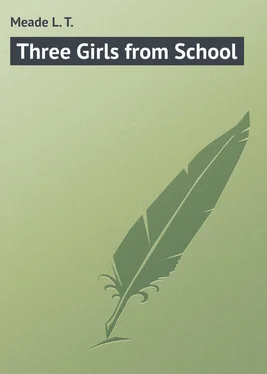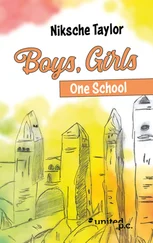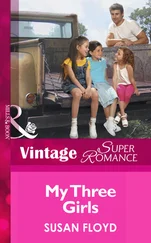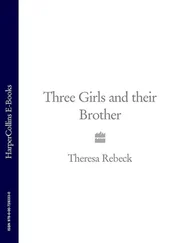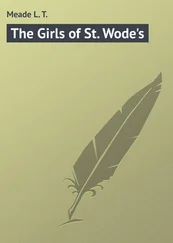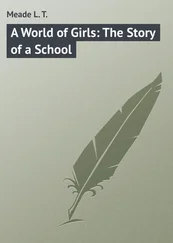L. Meade - Three Girls from School
Здесь есть возможность читать онлайн «L. Meade - Three Girls from School» — ознакомительный отрывок электронной книги совершенно бесплатно, а после прочтения отрывка купить полную версию. В некоторых случаях можно слушать аудио, скачать через торрент в формате fb2 и присутствует краткое содержание. Жанр: foreign_prose, foreign_children, на английском языке. Описание произведения, (предисловие) а так же отзывы посетителей доступны на портале библиотеки ЛибКат.
- Название:Three Girls from School
- Автор:
- Жанр:
- Год:неизвестен
- ISBN:нет данных
- Рейтинг книги:5 / 5. Голосов: 1
-
Избранное:Добавить в избранное
- Отзывы:
-
Ваша оценка:
- 100
- 1
- 2
- 3
- 4
- 5
Three Girls from School: краткое содержание, описание и аннотация
Предлагаем к чтению аннотацию, описание, краткое содержание или предисловие (зависит от того, что написал сам автор книги «Three Girls from School»). Если вы не нашли необходимую информацию о книге — напишите в комментариях, мы постараемся отыскать её.
Three Girls from School — читать онлайн ознакомительный отрывок
Ниже представлен текст книги, разбитый по страницам. Система сохранения места последней прочитанной страницы, позволяет с удобством читать онлайн бесплатно книгу «Three Girls from School», без необходимости каждый раз заново искать на чём Вы остановились. Поставьте закладку, и сможете в любой момент перейти на страницу, на которой закончили чтение.
Интервал:
Закладка:
“Here is your sheet of paper, Mabel; and here is your pen. And now I will dictate the note. Write what I say.”
Mabel began:
”‘Dear Mrs Priestley, – My friend Annie Brooke is taking this letter to you. The business is of great importance, and she will explain and make the necessary terms. I want you to lend me thirty pounds, please. Annie will arrange the terms; and I want you, please, not to tell anybody. You know Annie Brooke – she is my greatest friend. Aunt Henrietta will want me to have a specially beautiful dress to wear at the break-up, for I expect to take a most distinguished position there.’”
“Oh, must I put that in?” said Mabel.
“You must put what I tell you,” answered Annie. “Go on. Have you written ‘distinguished position’?”
“Yes – oh yes. This letter sounds perfectly horrid, and not a bit like me.”
“It will soon be finished now,” said Annie.
“Come, Mabel; you are chicken-hearted. You most pay something for your thirty pounds, you know.”
“Yes; but how on earth am I to return it to her?”
“I’ll manage that, goosey, goosey. Now then, proceed.
”‘I will call on you to-morrow in order to choose the dress. It must be very rich indeed, and with real lace on it. My aunt would wish me to look well dressed on the prize day. – Yours, Mabel Lushington.’
“Now, the date, please,” said Annie.
Mabel inserted it.
“Fold it up, please, and direct this envelope,” continued practical Annie. This was done and the letter slipped into Annie’s pocket. She then, to Mabel’s surprise, put another sheet of paper before that young lady.
“What does this mean?” said Mabel.
“You will write these words, please, Mabel:
“In acknowledgment of thirty pounds, I, Mabel Lushington, faithfully promise to invite Annie Brooke to spend the summer holidays with Lady Lushington and myself in Paris.”
“But, Annie,” cried poor Mabel, “I am terrified at having to write this.”
“Don’t write it, and the thing is off,” said Annie.
She moved to the other end of the room. Mabel sat the very picture of misery by the little table where the one candle burned. Some minutes went by. After a time Annie said:
“You may as well go on, for I hold your letter to Mrs Priestley in my pocket.”
“Oh, oh!” said Mabel, “I get more frightened of you, Annie, each moment. Well, what am I to say? I forget.”
“Darling, it is so easy,” said Annie in her gentlest tone. “Now then, I will dictate once more.”
She did so. The words were put down. Annie herself folded up this precious piece of paper, and put it for safety into the bosom of her dress.
“Now we are all right,” she said; “and I’ve got some chocolates to give you, and we can both curl up on the sofa and go to sleep until it’s time to wake Pris.”
Mabel and Annie were about to retire to the comfortable old lounge which occupied a place of honour in the sitting-room, when they were at once frightened and rejoiced by hearing a voice say very distinctly outside the schoolroom door:
“It is I – Priscie. Let me in.”
Annie immediately flew to the door, drew back the bolt, and admitted Priscilla. Priscilla was wearing a long, ugly, grey dressing-gown; her face looked nearly as grey. She came swiftly forward and put her manuscript on the table.
“Sign it,” she said to Mabel. “Be quick. Don’t hesitate, or I will draw back. I have lived through the most awful night; but there’s no use in waiting until five o’clock. I was up, and saw you two run across the lawn. I guessed you would come here, and I made up my mind. Be quick, Mabel Lushington – sign.”
“Here is your pen,” said Annie. – “Pris, you are a plucky girl. You’ll never repent of this.”
“You promise,” said Priscilla, “to pay me a year’s schooling?” She did not glance at Annie; her eyes were fixed on Mabel.
“Yes,” said Mabel, nodding to her and speaking with difficulty.
“You will get your money to-morrow evening, dear, at latest,” said Annie; “I mean the money for the autumn term.”
Still Priscilla did not look at Annie.
“Where is your paper?” she asked, her eyes still glued on Mabel’s face.
Annie supplied it.
“It is a very good paper,” she said. “You won’t be at all ashamed to read it. I only trust,” she added, “that it is not too good.”
One very bitter smile crossed Priscilla’s face for a moment. Then, going on her knees, she deliberately wrote with a defiant air her own signature at the foot of the essay which Annie had dictated and Mabel had written. Mabel’s weaker handwriting signed Priscilla’s paper. Then Priscilla, gathering up the false essay, folded it within her dressing-gown, and, without glancing at either girl, left the room.
“There,” said Annie when the door had closed behind her, “isn’t she just splendid? Haven’t we managed well? Oh! I am tired and sleepy. Aren’t you, Mabel?”
“I don’t know,” said Mabel. “I am bewildered. I never knew what it was before to feel just awfully wicked.”
“You will get over that, dear. We’ll just wait a minute longer, and then we’ll creep up to our rooms. What a good thing it was that I oiled the locks! There is no fear of any one finding us out.”
Chapter Six
Mrs Priestley
The town of Hendon was only a mile away from the school, and the girls constantly rode there on their bicycles. They were never allowed to go without a teacher accompanying them. Quite a favourite exercise was to ride through the little town and out into the country at the other end.
Mrs Priestley was one of the most fashionable dressmakers at Hendon, and had the custom of most of the best girls of the school. Those, however, who were a little poor or short of funds employed a certain Mrs Arnold, who was also fairly good, but did not produce nearly such stylish gowns as those which issued from the Priestley establishment.
When Annie, in her pretty way – for her manners could be exceedingly pretty when she chose – asked Mrs Lyttelton for permission to go to Mrs Priestley on the afternoon of the following day, that lady neither expressed nor felt surprise.
“You can certainly do so, my dear,” she said; “only don’t stay long. And why is not Mabel Lushington going herself? I did not know, Annie, that you had your dresses made by Mrs Priestley.”
“I don’t as a rule,” replied Annie in her sweet little, gentle voice. “My uncle can’t afford it. But on this special occasion – oh, it is a great secret, Mrs Lyttelton! – Uncle Maurice will let me have a very plain white muslin made by Mrs Priestley. You know it isn’t the material that counts so much; it is the way a dress is cut and made up. Mrs Priestley has such exquisite style.”
“That is certainly the case,” said Mrs Lyttelton. “Then you are going there about your dress?”
“I am; but, please, you won’t betray me?”
“Betray you, dear Annie? What do you mean?”
“I don’t want the girls to know that I am to wear a Priestley dress until the great day. It is just my own little secret. You won’t breathe it, dear Mrs Lyttelton?”
“Certainly not, my child. I am glad that such a small thing gives you pleasure. And it is quite natural,” she added, “that a young girl should wish to be well dressed. But don’t think too much of it, Annie. Our dresses are by no means the most important things in life.”
“I could not live with you,” said Annie, “without being well aware of that.”
There came a pretty colour into her cheeks, which always made her look very nearly beautiful; and her eyes lost that expression which made some people who were not her greatest friends consider Annie Brooke just a tiny bit “not straight, you know.”
Читать дальшеИнтервал:
Закладка:
Похожие книги на «Three Girls from School»
Представляем Вашему вниманию похожие книги на «Three Girls from School» списком для выбора. Мы отобрали схожую по названию и смыслу литературу в надежде предоставить читателям больше вариантов отыскать новые, интересные, ещё непрочитанные произведения.
Обсуждение, отзывы о книге «Three Girls from School» и просто собственные мнения читателей. Оставьте ваши комментарии, напишите, что Вы думаете о произведении, его смысле или главных героях. Укажите что конкретно понравилось, а что нет, и почему Вы так считаете.
